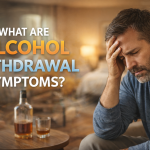Alcohol use disorder, commonly known as alcoholism, is a widely known problem that has impacted millions of people worldwide. According to the National Institute on Alcohol Abuse and Alcoholism (NIAAA), approximately 14.5 million adults in the United States alone have Alcohol Use Disorder (AUD). Alcohol addiction does not only affect the person who is dependent on alcohol but also affects families, the workplace, and society. Identifying the signs of alcohol addiction is important for prevention as well as for the right treatment process.
Understanding Alcohol Addiction
Alcohol addiction is a chronic disease characterized by an inability to control or stop drinking despite negative consequences. It has physical as well as mental effects. On the physical level, the body craves alcohol to maintain its normal functions; if the intake of alcohol is discontinued, withdrawal symptoms are experienced. On a psychological level, the patient may develop extreme turmoil in the form of cravings and compulsive drinking behavior.
The following are the causes of the development of alcohol addiction: Genetics is an important factor; research has established that people with a family history of alcoholism are likely to be at risk. Other factors include factors such as alcohol intake at a tender age or being surrounded by people who drink a lot of alcohol. Also, mental disorders such as depression, anxiety, and trauma are associated with substance use, where people resort to taking alcohol.
Common Signs of Alcohol Addiction
Recognizing the signs of alcohol addiction can be challenging, especially because those struggling with it often go to great lengths to hide their problem. Nevertheless, several physical, behavioral, and psychological signs can be taken as warning signs of alcohol addiction.

Physical Signs:
- Changes in Appearance: Some of the common symptoms that can be associated with the use of alcohol include weight loss, pale or flushed skin, and a lack of personal hygiene. It also has more severe physical effects if one drinks alcohol for an extended period, including the yellowing of the skin and eyes because of liver damage.
- Withdrawal Symptoms: Alcohol addiction is a condition that affects individuals who drink alcohol, and when such a person decides to reduce or stop the intake of alcohol, he or she may experience withdrawal symptoms. These can range from as mild as shaking, excessive sweating, and vomiting to as extreme as convulsions and hallucinations. The occurrence of withdrawal symptoms is good evidence of alcohol dependence.
- Increased Tolerance and Consumption: Alcohol tolerance develops as the body gets used to alcohol, and thus, the person consumes more alcohol to get the same effects. This increased tolerance can lead to a dangerous cycle of escalating consumption and dependence.
Behavioral Signs:
Neglecting Responsibilities: Another symptom of alcohol addiction is poor performance at the workplace, school, or even at home. People can begin to miss their work and school deliverables, forget to cook and clean, or even miss important family functions to engage in drinking.
Drinking in Secret or Lying About Alcohol Consumption: Alcohol addicts will do their best to conceal their addiction. They may drink by themselves, hide alcohol in places that are not typical, or even try to mislead others about the amount they have taken. This kind of behavior is an unmistakable sign of alcohol addiction.
Loss of Interest in Activities: As alcohol becomes the central focus of their life, individuals may lose interest in hobbies, social activities, and other things they once enjoyed. This is usually accompanied by a change of friends as the person starts to associate with people who drink as they do.
Psychological Signs:
- Mood Swings, Irritability, or Depression: Alcohol addiction affects mental health in a very negative way. Sufferers may have mood swings, irritability, and periods of depression. Alcohol is a depressant and therefore its consumption can worsen the state of a person’s mental health or trigger the onset of a new disorder.
- Anxiety or Paranoia Related to Drinking: Social anxiety is also a well-known feature of individuals with alcohol use disorder. It is also possible to experience paranoia, for example, when there is no alcohol or when one has to face the consequences of alcohol consumption.
- Cravings and Obsessive Thoughts About Alcohol: There is a psychological marker that is regarded as a strong sign of alcohol dependence and this is craving. Cravings can build up to a point where they outdo any other need and the affected person will be compelled to drink at unsuitable times or places.
100% Confidential Support is Available 24/7
No matter what you’re going through, you’re not alone. Our dedicated team is here to provide a safe, judgment-free space where you can talk openly and honestly. Whether you need emotional support, resources, or just someone to listen.
We’re here for you—completely confidential and always respectful of your privacy. Call us today!
Long-Term Effects of Untreated Alcohol Addiction
If left untreated, alcohol addiction can have devastating long-term effects on an individual’s health, relationships, and overall quality of life.
Health Consequences: Alcohol abuse is likely to cause various severe health complications. It is widely known that liver diseases such as cirrhosis and alcoholic hepatitis are among the most common. Furthermore, alcohol can lead to cardiovascular diseases because it raises blood pressure and increases the danger of heart disease. Neurological disorders, such as memory loss, cognitive deterioration, and a high risk of stroke, are also typical in long-term alcoholics. In addition, alcohol addiction lowers the immune system, making the body vulnerable to diseases and other ailments.
Impact on Relationships: Alcohol addiction can strain or destroy personal and professional relationships. The irritability, mood swings, and poor performance in the responsibilities that are linked to alcoholism can lead to conflicts with family members, friends, and colleagues. Over time, the trust and the bond in these relationships can be easily broken, and the person will end up being isolated and lonely.
Legal and Financial Troubles: Alcohol addiction causes a lot of legal and financial issues. It is illegal to drive under the influence of alcohol or drugs (DUI) and the consequences include: fines, loss of license, and, in some cases, one may be jailed. Additionally, the financial burden of sustaining an alcohol addiction can be overwhelming. It can cause job loss, unemployment, and even bankruptcy.
When to Seek Help
Understanding the symptoms of alcohol addiction is only the first step; knowing when to seek professional intervention is also important. If you or your family member has any of the symptoms described above, it is high time to seek professional help.
Early intervention is crucial in the treatment of alcohol addiction. The earlier an individual gets treatment, the higher the possibility of him or her getting back to a normal life. The different forms of treatment may include outpatient services, group therapy, inpatient treatment, or residential treatment, depending on the intensity of the addiction. Getting help is not easy, but it’s important to remember that alcohol addiction is a treatable condition, and recovery is possible with the right support and resources.

Alcohol addiction is a dangerous disorder that affects a large number of people, but when recognized early, the results can be quite different. At Palm Coast Treatment Solutions, we know how difficult it is to fight alcohol addiction and we are with you in this process. For further information on how to start the process of recovery, contact us at (386) 284-4151 today.






















